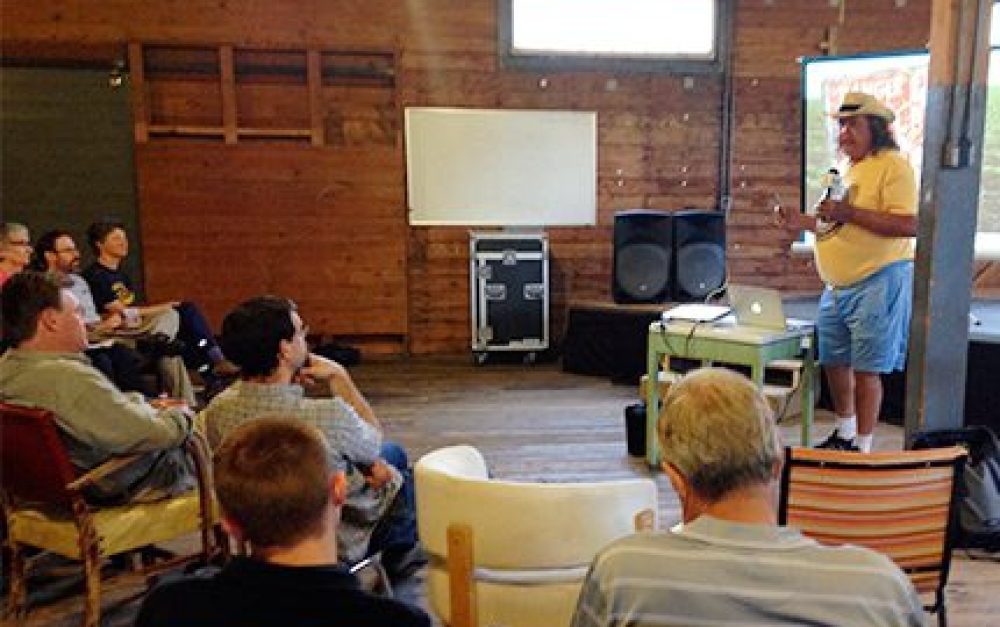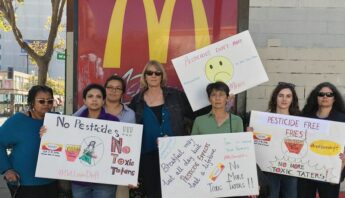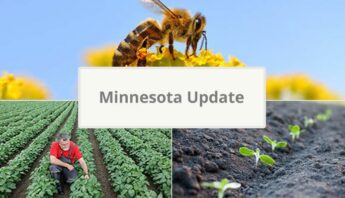Last Tuesday, I spent the evening in Bemidji, Minnesota with the Toxic Taters Coalition. Under the lofty wood ceilings of the Rail River Folk School, a group of local residents gathered, seated in a semi-circle of old cinema seats, listening attentively to stories from potato country.
The gathering in Bemidji was the third event in the Toxic Taters Coalition’s statewide speaking tour with the goal of building support for safer potato fields across the state. By raising the profile of pesticide contamination from conventional potato production, Toxic Taters is turning up the heat on fast-food giant McDonald's and one of its primary potato suppliers, R.D. Offutt Company (RDO).
Each speaking tour event is possible because of local partner organizations that host Toxic Taters for an evening. In Bemidji, our hosts were the Indigenous Environmental Network, Sustainable Tuesdays, and the folk school. In April, we shared a potluck meal (and shelter from an early-spring blizzard!) with the innovative folks at the Hunt Utilities Group in Pine River, MN. And at the beginning of June, we gathered in a Minneapolis church with members of the Land Stewardship Project and other Twin Cities supporters.
As RDO’s operation expands its reach across the state, more and more people are being affected by the issues that come with large-scale, conventional potato production: pesticide drift, nitrate and pesticide contamination of drinking water, drawdown of the water table from irrigation wells.
The Toxic Taters speaking tour also reminds me that, as more people feel the harmful effects of industrial agriculture, there are also more chances for people across communities to amplify the call for a healthier, more just food system. Committed people around the state have shown up to hear the powerful testimony of Toxic Taters leaders, people whose lives have been directly impacted by pesticide drift from potato fields. Minnesotans are paying attention, and they want change.
RDO's solutions?
RDO has certainly taken notice of Toxic Taters. And the company seems eager to quietly resolve concerns over pesticide drift. Unfortunately, so far RDO’s proposed solutions haven’t directly addressed the clear requests put forward by the Coalition’s local members.
In March, RDO’s CEO, Keith McGovern, wrote a response to Toxic Taters in the Park Rapids Enterprise, a local paper in Minnesota’s potato-producing region. McGovern cited RDO’s progress in select potato fields in the Park Rapids area, where the company has reduced fertilizer use and implemented an “alternative fungicide program.” He closed his statement by saying: “We are committed to working with the community and ensuring that Park Rapids remains a great place to live and work.”
It’s important that RDO is paying attention — and is perhaps making some progress. But if the company is truly committed to supporting the health of communities near its potato fields, RDO has the responsibility to really hear the needs and requests that directly affected communities are voicing.
The Toxic Taters Coalition has been clear about its requests of McDonald’s and RDO, which include asking the corporations to:
- cut pesticide use on potatoes,
- work with a third party certifier to transition to sustainable practices,
- increase transparency about pesticide use, and
- fund a public health study in areas impacted by potato production.
So with RDO’s latest announcements, how far have they gotten on the Coalition’s demands? Based on McGovern’s statement, RDO may be on its way to cutting pesticide usage. However, since Minnesota doesn’t require pesticide applicators to disclose pesticide use, we can’t know for sure how much progress RDO has made.
It’s concerns like these that led the Toxic Taters Coalition to include “transparency” as a key demand. After years of public promises from RDO and McDonald’s, Toxic Taters is ready to know exactly what’s happening in the fields next door to their homes, schools and farms – by the numbers. Similarly, local residents deserve to have input on which third-party certifier is giving the seal of approval to RDO’s farming practices.
McDonald’s passes the buck
Since the Toxic Taters official campaign launch in February, RDO has responded publicly to the campaign. But McDonald’s has stayed in the background so far. In fact, every time Toxic Taters reaches out to McDonald’s, the Coalition gets a response from RDO instead. Open communication with RDO is a good thing; the cold shoulder from McDonald’s is not.
It helps to remember why Toxic Taters is looking to McDonald’s in the first place. Members of the Coalition have been bringing their concerns to RDO for many years. They’ve gotten plenty of responses from RDO, but no clear commitments or real transparency. At the end of the day, RDO is accountable to its major customers — companies like McDonald’s. Toxic Taters is looking to McDonald’s to help RDO move from vague, voluntary promises to clear, improved standards.
Whose food system?
As McDonald’s and RDO churn out PR statements about their sustainability practices, Toxic Taters will keep calling on these companies to make good on their promises. It’s about pesticides in the air, water and local communities, certainly. But it’s also about whether our food system will continue to be shaped by large companies that stand to profit from the status quo — with frontline communities continuing to bear the brunt of chemically dependent industrial agriculture.
Members of the Toxic Taters Coalition have a clear picture of the costs of our current food system. They're calling for real solutions, and it's time for RDO and McDonald's to make it happen.
Watch the video below to see members of the Toxic Taters Coalition in action!








